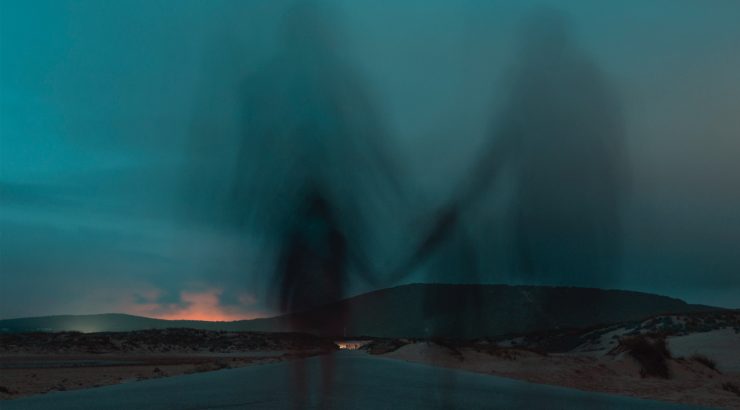
Government Corruption, Fear for Loved Ones, Civil Unrest Top Fears in America A majority of Americans believe places can be haunted by spirits
October 14, 2021
7th Annual Chapman University Survey of American Fears
By the Fear Team
The annual Chapman University Survey of American Fears provides an in-depth examination into the concerns of average Americans, tracking changes and trends over the years. The survey asks about more than 100 topics ranging from government, health, and environmental matters, to crime, COVID-19, the paranormal, and personal anxieties.
“For the sixth year in a row, the most common fear of Americans was the fear of corrupt government officials,” said Dr. Edward Day. “Nearly 80% of Americans are afraid of corrupt officials. The next most common fear, of people I love dying, was over twenty percentage points lower.”
The top 10 fears of Americans have shifted notably since 2019. Fear of loved ones dying has risen from its previous rank as fifth to second place – even while its share of Americans has dropped from 62.9% in 2019 to 58.5%. Fear of both widespread civil unrest and a loved one contracting COVID-19 make their debut in the top 10, with approximately equal shares of Americans reporting fear of these. Fear of loved ones becoming seriously ill, on the other hand, has dropped in its rank from third to fourth place in conjunction with a decrease in fear from 66.7% in 2019 to 57.3%. Once again aligning with the major events of 2020, fear of a pandemic/major epidemic, economic/financial collapse, and biological warfare debut on the top 10’s lower end. Fears of cyber-terrorism and pollution of oceans, rivers and lakes have each dropped in rank. Cyber-terrorism has gone from seventh to eighth place, down nearly 8% (59.2% in 2019), while pollution of large bodies of water has dropped from second to ninth place and lost nearly 18% of its share of Americans (68.0% in 2019).
| Top Ten Fears of 2020/2021 | % Very Afraid or Afraid |
| 1. Corrupt government officials | 79.6 |
| 2. People I love dying (#5 in 2019) | 58.5 |
| 3. A LOVED ONE CONTRACTING THE CORONAVIRUS (COVID-19) | 58 |
| 4. People I LOVE BECOMING SERIOUSLY ILL (#3 in 2019) | 57.3 |
| 5. WIDESPREAD CIVIL UNREST | 56.5 |
| 6. A pandemic or a major epidemic | 55.8 |
| 7. Economic/financial collapse | 54.8 |
| 8. Cyber-terrorism (#7 in 2019) | 51.0 |
| 9. Pollution of oceans, rivers and lakes (#2 IN 2019) | 50.8 |
| 10. Biological warfare | 49.3 |
Source: Chapman University Survey of American Fears, Wave 7, 2020/21, n=1,035
Fear of COVID-19
 The impact of COVID-19 on American life is widespread. Some 79.2% of respondents indicated they know someone who has had COVID-19 and 42.5% indicated they personally know someone who died of COVID-19 or was hospitalized. Furthermore, 7.9% of respondents indicated that they, personally, have had COVID-19.
The impact of COVID-19 on American life is widespread. Some 79.2% of respondents indicated they know someone who has had COVID-19 and 42.5% indicated they personally know someone who died of COVID-19 or was hospitalized. Furthermore, 7.9% of respondents indicated that they, personally, have had COVID-19.
Over one-third (38%) of adults say they are afraid or very afraid of catching COVID-19. As a comparison, 16.7% of adults are afraid or very afraid of catching the seasonal flu. This is on par with 2019 when 17% reported fear of catching the seasonal flu. Three-fifths (60.8%) of respondents strongly disagree/disagree that the government has gone too far in restricting businesses and individuals in the current pandemic. Related to personal safety measures, 81.9% of respondents strongly agree/agree that the benefits of wearing masks outweigh the consequences of not wearing them.
Notably, COVID-19 fears are deeply partisan. Among all respondents: 19% of self-identified Republicans say they are very afraid/afraid of catching COVID-19 compared to 53.8% of Democrats. Interestingly, twice as many self-identified Republicans (11.5%) as Democrats (6.1%) indicate they have personally had COVID-19. When considering only those respondents who’ve not reported personally having COVID-19 (n=949), the partisan divide still exists. Slightly over one in four (27%) of self-identified Republicans say they’re very afraid/afraid of contracting the disease, while almost twice as many (53.4%) of self-identified Democrats report the same. This polarization extends to fear over a loved one contracting the coronavirus with 73.1% of Democrats saying they are very afraid/afraid compared to 39.6% of Republicans.
“As we noted in our book, many fears are linked to party identification. This year, the partisan divide in fears over COVID-19 extends to vaccine hesitancy and mask wearing. It’s tragic that public health measures have become polarized because it’s costing lives,” said Dr. Ann Gordon, associate professor of political science at Chapman University.
Paranormal America in 2020/21
“We are living an increasingly paranormal world,” said Dr. Christopher Bader, professor of sociology at Chapman University. We asked Americans about seven different
paranormal topics – hauntings, ancient aliens, modern aliens, fortune telling, Bigfoot, Atlantis and telekinesis. “More than a third of Americans believe that aliens have visited earth in our ancient past and in modern times. More than half of us believe in Atlantis. Even more believe that places can be haunted by spirits.”
Even more surprising is just how normal the paranormal has become. Nearly ¾ of Americans (72%) believed in at least one of these subjects. More than a third (34%) of Americans expressed belief in 2-4 of these items. One fifth (20%) believed in five or more. Indeed, only 28% of Americans were truly skeptical – believing in none of these paranormal topics. “If you don’t believe in the paranormal at all,” said Dr. Christopher Bader, “you are the oddball in modern America.”
There are some demographic characteristics that seem to predict paranormal belief. People with lower levels of education and/or lower levels of income expressed significantly higher levels of paranormal belief. Females were more likely to believe in the paranormal than males.
| Paranormal Beliefs 2020/21 | % Strongly Agree or Agree |
| 1. PLACES CAN BE HAUNTED BY SPIRITS | 52.7 |
| 2. ANCIENT ADVANCED CIVILIZATIONS, SUCH AS ATLANTIS, ONCE EXISTED | 50.2 |
| 3. ALIENS HAVE VISITED THE EARTH IN OUR ANCIENT PAST | 42.7 |
| 4. ALIENS HAVE COME TO EARTH IN MODERN TIMES | 35.3 |
| 5. FORTUNE TELLERS AND PSYCHICS CAN FORESEE THE FUTURE | 20.7 |
| 6. BIGFOOT IS A REAL CREATURE | 18.0 |
| 7. SOME PEOPLE CAN MOVE OBJECTS WITH THEIR MINDS | 17.2 |
Source: Chapman University Survey of American Fears, Wave 7, 2020/21, n=1,035
A full list of all the fears from The Chapman University Survey on American Fears 2020/2021 is available at the Chapman Fear Website.
Dr. Christopher Bader, Dr. Ed Day, and Dr. Ann Gordon are co-authors (along with Joseph O. Baker) of Fear Itself: Causes and Consequences of Fear in America, 2020, Routledge.
In addition to Bader, Day and Gordon, student undergraduate research fellows played a key role throughout the process. Take a look!
Survey Methodology
The CSAF was conducted online via the SSRS Probability Panel among adults age 18 and older who participated via the web on PC, laptop, tablet or mobile phone. It included 1,035 participants with a margin of error of +/- 3.9%. Data collection was conducted from January 5 to January 15, 2021. Because the survey was fielded at the start of 2021, we have used 2020/2021 as the designation.
The SSRS Panel members are recruited randomly from a dual-frame random digit dial (RDD) sample, through the SSRS Omnibus Survey. The SSRS Omnibus survey is a national (50-state), bilingual telephone survey. The sample used for the Chapman University Survey of American Fears mirrors the demographic characteristics of the U.S. Census. For additional methodological details, see the full report.



